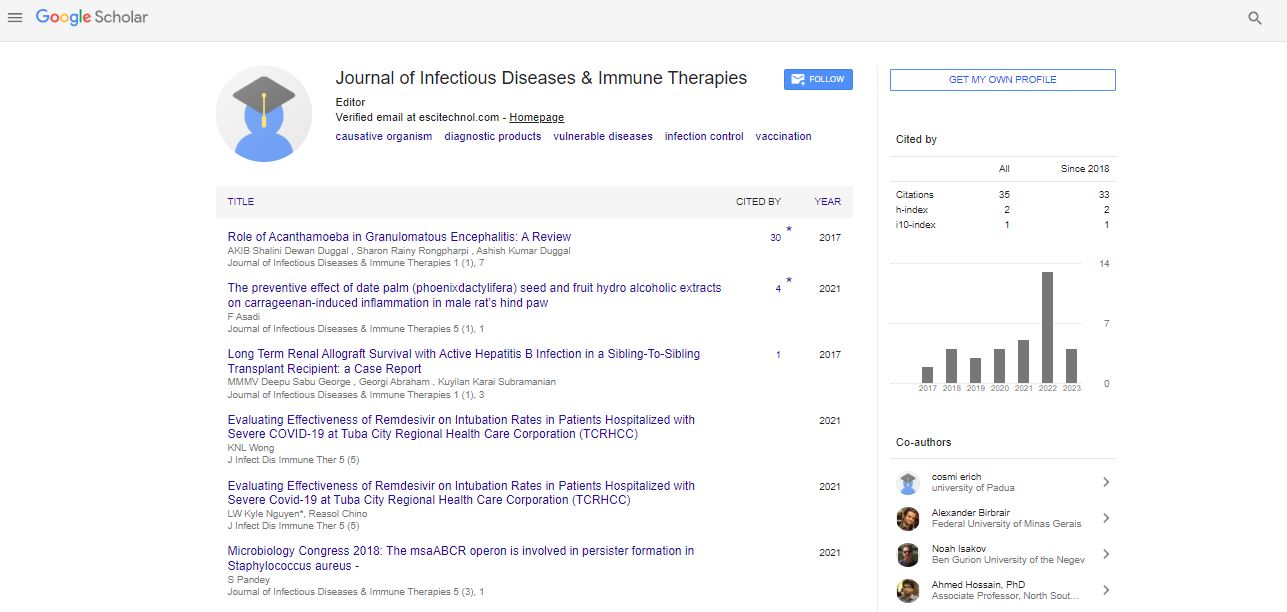Short Communication, Vol: 12 Issue: 2
Unraveling the Complexity of Intestinal Diseases: A Comprehensive Overview
Accardo Sharaf*
Department of Precision and Microsystems Engineering, Delft University of Technology, Mekelweg, Netherlands
*Corresponding Author: Accardo Sharaf
Department of Precision
and Microsystems Engineering, Delft University of Technology, Mekelweg,
Netherlands
E-mail: sharaf.accardo@tudelft.nl
Received date: 27 May, 2023, Manuscript No. JIDITH-23-106361;
Editor assigned date: 29 May, 2023, Pre QC No. JIDITH-23-106361 (PQ);
Reviewed date: 15 June, 2023, QC No. JIDITH-23-106361;
Revised date: 23 June, 2023, Manuscript No. JIDITH-23-106361(R);
Published date: 30 June, 2023, DOI: 10.4172/2329-9541.1000348
Citation: Sharaf A (2023) Unraveling the Complexity of Intestinal Diseases: A Comprehensive Overview. J Immunol Tech Infect Dis 12:2.
Description
Intestinal diseases encompass a wide range of conditions that affect the gastrointestinal tract, leading to significant morbidity and mortality worldwide. This manuscript aims to provide a comprehensive overview of intestinal diseases, including their etiology, pathophysiology, clinical manifestations, diagnosis, and management strategies. We explore common intestinal diseases such as inflammatory bowel disease, irritable bowel syndrome, celiac disease, and colorectal cancer, shedding light on the latest research and advancements in understanding these complex disorders. By enhancing our knowledge of intestinal diseases, we can improve patient care, develop more effective treatment strategies, and ultimately strive for better outcomes for individuals living with these conditions.
The human intestine serves as a vital organ responsible for nutrient absorption, digestion, and maintaining gut barrier integrity. However, it is susceptible to various diseases that can disrupt its normal function and impact overall health [1]. Intestinal diseases can be classified into inflammatory, functional, infectious, and neoplastic categories. Each category presents unique challenges in terms of diagnosis and management, necessitating a comprehensive understanding of the underlying mechanisms. This manuscript aims to provide a detailed exploration of the etiology, pathophysiology, clinical features, diagnosis, and management of intestinal diseases, focusing on selected common conditions [2].
Inflammatory Bowel Disease (IBD), comprising Crohn's disease and ulcerative colitis, is a chronic inflammatory condition characterized by relapsing and remitting gastrointestinal inflammation [3]. We discuss the multifactorial etiology involving genetic, environmental, and immunological factors. The immune dysregulation and the disruption of the gut microbiota play crucial roles in disease pathogenesis [4]. Diagnostic approaches, including endoscopic evaluation, imaging studies, and biomarker analysis, are examined, along with the current therapeutic strategies aimed at inducing and maintaining remission, such as immunosuppressant’s, biologics, and targeted therapies [5].
Irritable Bowel Syndrome (IBS) is a functional gastrointestinal disorder characterized by recurrent abdominal pain, altered bowel habits, and bloating [6]. The delves into the etiology, which involves a combination of genetic, environmental, and psychological factors. We explore the pathophysiology, focusing on altered gut-brain communication and visceral hypersensitivity. The Rome criteria for diagnosing IBS and the role of symptom-based subtyping are discussed. Management strategies encompass lifestyle modifications, dietary interventions, probiotics, and medications targeting specific symptoms [7].
combination of genetic, environmental, and psychological factors. We explore the pathophysiology, focusing on altered gut-brain communication and visceral hypersensitivity. The Rome criteria for diagnosing IBS and the role of symptom-based subtyping are discussed. Management strategies encompass lifestyle modifications, dietary interventions, probiotics, and medications targeting specific symptoms [8].
Colorectal Cancer (CRC) is a malignant neoplasm arising from the colon or rectum and is a leading cause of cancer-related deaths globally [9]. We explore the risk factors, including genetic and environmental influences, and the multistep process of carcinogenesis. Screening and early detection strategies, such as colonoscopy and fecal occult blood testing, are crucial for improving outcomes. Treatment modalities, including surgery, chemotherapy, targeted therapy, and immunotherapy, are examined, along with advancements in personalized medicine [10].
Intestinal diseases pose significant challenges to individuals and healthcare systems worldwide. This manuscript provides a comprehensive overview of key intestinal diseases, including their etiology, pathophysiology, clinical features, diagnosis, and management. By enhancing our understanding of these complex conditions, healthcare professionals can deliver more targeted and effective treatments, improving patient outcomes and ultimately reducing the burden of intestinal diseases on individuals and society. Continued research and collaboration are essential to unraveling the complexities of intestinal diseases and developing innovative approaches to prevention, diagnosis, and treatment.
References
- Logan I, Bowlus CL (2010) The geoepidemiology of autoimmune intestinal diseases. Autoimmun Rev 9(5): A372-8.
- Kim MH, Kim H (2017) The roles of glutamine in the intestine and its implication in intestinal diseases. Int J Mol Sci 18(5): 1051.
[Google Scholar] [PubMed]
- Subramanian S, Geng H, Tan XD (2020) Cell death of intestinal epithelial cells in intestinal diseases. Sheng Li Xue Bao 72(3): 308.
[Google Scholar] [PubMed]
- Roccarina D, Lauritano EC, Gabrielli M, Franceschi F, Ojetti V et.al (2010) The role of methane in intestinal diseases. Am J Gastroenterol 105(6): 1250-6.
- Van Der Vliet A, Bast A (1992) Role of reactive oxygen species in intestinal diseases. Free Radic Biol Med 12(6):499-513.
- Beamish LA, Osornio-Vargas AR, Wine E (2011) Air pollution: An environmental factor contributing to intestinal disease. J Crohns Colitis 5(4): 279-86
- German AJ, Hall EJ, Day MJ (2003) Chronic intestinal inflammation and intestinal disease in dogs. J Vet Intern Med 17(1): 8-20
- Thomson A, Hemphill D, Jeejeebhoy KN (1998) Oxidative stress and antioxidants in intestinal disease. Dig Dis. 16(3): 152-8
- Tibble JA, Sigthorsson G, Foster R, Forgacs I, Bjarnason I (2002) Use of surrogate markers of inflammation and Rome criteria to distinguish organic from nonorganic intestinal disease. Gastroenterology. 123(2):450-60
- Xu S, He Y, Lin L, Chen P (2021) The emerging role of ferroptosis in intestinal disease. Cell Death & Disease. 12(4): 289
 Spanish
Spanish  Chinese
Chinese  Russian
Russian  German
German  French
French  Japanese
Japanese  Portuguese
Portuguese  Hindi
Hindi 